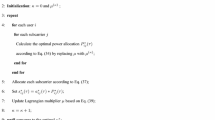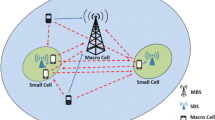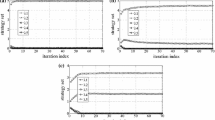Abstract
In this paper, we consider power control for the uplink of a direct-sequence code-division multiple-access data network. In the uplink, the purpose of power control is for each user to transmit enough power so that it can achieve the required quality of service without causing unnecessary interference to other users in the system. One method that has been very successful in solving this purpose for power control is the game-theoretic approach. The problem for power control is modified as a Nash equilibrium problem in which each user can choose its transmit power in order to maximize its own utility, and a Nash equilibrium is an ideal solution of the power-control game. We present a noncooperative power-control game in which each user can choose the transmit power in a way that it gets the sufficient signal-to-interference-plus-noise ratio and maximizes its own utility. To ensure the existence of a solution, we also propose the variational inequality problem which is connected with the proposed game. On a linear receiver, we deal with the matched filter receiver. Next we present a new ergodic algorithm for the proposed power control because the existing iterative algorithms can not be applied effectively to the proposed power control. We also present convergence analysis for the proposed algorithm. In addition, applying the proposed algorithm to the proposed power control, we provide numerical examples for the transmit power, the signal-to-interference-plus-noise ratio and so on. Numerical results for the proposed algorithm shall show that as compared with the existing power-control game and its method, all users in the network can enjoy the sufficient signal-to-interference-plus-noise ratio and achieve the required quality of service.
Similar content being viewed by others
References
Bakushinsky, A., Goncharsky, A.: Ill-Posed Problems: Theory and Applications. Kluwer Academic, Dordrecht (1994)
Bauschke, H.H., Borwein, J.M.: On projection algorithms for solving convex feasibility problems. SIAM Rev. 38, 367–426 (1996)
Bauschke, H.H., Borwein, J.M., Lewis, A.S.: The method of cyclic projections for closed convex sets in Hilbert space. Contemp. Math. 204, 1–38 (1997)
Biguesh, M., Shahbazpanahi, S., Gershman, A.B.: Robust downlink power control in wireless cellular systems. EURASIP J. Wireless Commun. Netw. 2004(2), 261–272 (2004)
Bruck Jr., R.E.: On the weak convergence of an ergodic iteration for the solution of variational inequalities for monotone operators in Hilbert space. J. Math. Anal. Appl. 61, 159–164 (1977)
Dai, H., Mailaender, L., Poor, H.V.: CDMA downlink transmission with transmit antenna arrays and power control in multipath fading channels. EURASIP J. Wireless Commun. Netw. 2004(1), 32–45 (2004)
Facchinei, F., Pang, J.S.: Finite-Dimensional Variational Inequalities and Complementarity Problems I. Springer, New York (2003)
Goebel, K., Kirk, W.A.: Topics in Metric Fixed Point Theory. Cambridge University Press, Cambridge (1990)
Goebel, K., Reich, S.: Uniform Convexity, Hyperbolic Geometry, and Nonexpansive Mappings. Dekker, New York (1984)
Goodman, D., Mandayam, M.: Power control for wireless data. IEEE Pers. Commun. 7(2), 48–54 (2000)
Han, Z., Farrokhi, F.R., Liu, K.J.R.: Joint power control and blind beamforming over wireless networks: a cross layer approach. EURASIP J. Appl. Signal Process. 2004(5), 751–761 (2004)
Iiduka, H., Yamada, I.: A subgradient-type method for the equilibrium problem over the fixed point set and its applications. Optimization. doi:10.1080/02331930701762829
Iusem, A.N., Sosa, W.: Iterative algorithms for equilibrium problems. Optim. 52, 301–316 (2003)
Ji, H., Huang, C.Y.: Non-cooperative uplink power control in cellular radio systems. Wirel. Netw. 4(3), 233–240 (1998)
Meshkati, F., Poor, H.V., Schwartz, S.C., Mandayam, N.B.: An energy-efficient approach to power control and receiver design in wireless data networks. IEEE Trans. Commun. 53(11), 1885–1894 (2005)
Nash, J.F.: Equilibrium points in n-person games. Proc. Natl. Acad. Sci. U. S. A. 36, 48–49 (1950)
Nash, J.F.: Non-cooperative games. Ann. Math. 54, 286–295 (1951)
Owen, G.: Game theory. W. B. Saunders, London (1968)
Reich, S.: Some problems and results in fixed point theory. Contemp. Math. 21, 179–187 (1983)
Rodriguez, V.: Robust modeling and analysis for wireless date resource management. In: Proc. IEEE Wireless Commun. Netw. Conf. pp. 717–722, New Orleans, March 2003
Sampath, A.S., Kumar, P.S., Holtzman, J.M.: Power control and resource management for a multimedia CDMA wireless system. In: Proc. IEEE PIMRC ’95 (1995)
Saraydar, C.U., Mandayam, N.B., Goodman, D.J.: Efficient power control via pricing in wireless data networks. IEEE Trans. Commun. 50(2), 291–303 (2002)
Solodov, M.V., Svaiter, B.F.: A new projection method for variational inequality problems. SIAM J. Control Optim. 37, 765–776 (1999)
Stark, H., Yang, Y.: Vector Space Projections: A Numerical Approach to Signal and Image Processing, Neural Nets, and Optics. Wiley, New York (1998)
Sung, C.W., Wong, W.S.: Power control and rate management for wireless multimedia CDMA systems. IEEE Trans. Commun. 49(7), 1215–1226 (2001)
Sung, C.W., Wong, W.S.: A noncooperative power control game for multirate CDMA data networks. IEEE Trans. Wirel. Commun. 2(1), 186–194 (2003)
Takahashi, N., Yukawa, M., Yamada, I.: An efficient power control for infeasible downlink scenarios—Global-local fixed-point-approximation technique. IEICE Trans. Fundam. E89-A(8), 2107–2118 (2006)
Takahashi, W.: Nonlinear Functional Analysis. Yokohama, Yokohama (2000)
Tse, D.N.C., Hanly, S.V.: Linear multiuser receivers: effective interference, effective bandwidth and user capacity. IEEE Trans. Inf. Theory 45(2), 641–657 (1999)
Yamada, I.: The hybrid steepest descent method for the variational inequality problem over the intersection of fixed point sets of nonexpansive mappings. In: Butnariu, D., Censor, Y., Reich, S. (eds.) Inherently Parallel Algorithms for Feasibility and Optimization and Their Applications, pp. 473–504. Elsevier, New York (2001)
Yates, R.D.: A framework for uplink power control in cellular radio systems. IEEE J. Sel. Areas Commun. 13(7), 1341–1347 (1995)
Author information
Authors and Affiliations
Corresponding author
Rights and permissions
About this article
Cite this article
Iiduka, H., Yamada, I. An Ergodic Algorithm for the Power-Control Games for CDMA Data Networks. J Math Model Algor 8, 1–18 (2009). https://doi.org/10.1007/s10852-008-9099-4
Received:
Accepted:
Published:
Issue Date:
DOI: https://doi.org/10.1007/s10852-008-9099-4
Keywords
- Nash equilibrium problem
- Power control
- Variational inequality problem
- Nonexpansive mapping
- Utility function
- Ergodic algorithm




